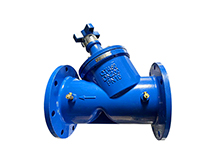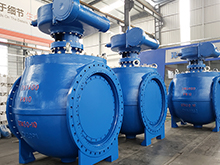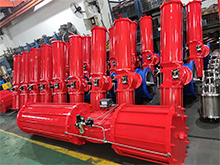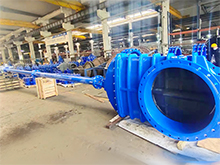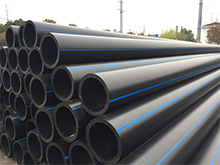- Gate valve
-
- DN1000 Extension stem double flange soft seal gate valveDIN F4 resilient seated gate valveDN450-1200 Resilient Seated Gate ValveDIN F5 resilient seated gate valveSocket connection soft seal gate valveUnderground cap soft seal gate valveBS5163 rising stem soft seal gate valveHard seal gate valveAPI slab Gate ValveStainless steel flange gate valveWafer knife gate valvePneumatic gate valveSoft seal gate valveExtension stem gate valveUL/FM fire protection groove ends gate valveRising stem forged steel gate valvecarbon steel gate valveStainless steel threaded gate valveDIN soft seal gate valveANSI soft sealing gate valve 200PSICast iron gate valveBS resilient seated gate valve
- Butterfly valve
-
- DN900 pneumatic triple eccentric hard seal butterfly valveD643H Triple Eccentric Butterfly ValveD343H Hard seal butterfly valveMulti standard EPDM seated butterfly valveSingle flange butterfly valveDN2000 Double eccentric butterfly valveFlange butterfly valveLug butterfly valveWafer butterfly valve with handleWorm gear operated butterfly valveWafer lined fluorine butterfly valveStainless steel wafer butterfly valveStainless steel flanged butterfly valveThree eccentric flange butterfly valvePneumatic flanged butterfly valvePneumatic wafer butterfly valveTriple eccentric butterfly valve wafer typeWafer butterfly valve ULC approvedInflatable seat butterfly valveHigh performance butterfly valveGrooved end butterfly valveElectric soft seal butterfly valveFlange fluorine lined butterfly valveHandle aluminum butterfly valveWorm Gear Aluminum Butterfly ValveFull PTFE lined butterfly valve wafer typeOne stem no-pin wafer butterfly valveMulti standard aluminum stem butterfly valveStainless Steel wafer Butterfly ValveAluminium handle operated lug butterfly valveLever Operated Flange Butterfly ValveButterfly valve stemButterfly valve discButterfly valve seat
- Ball valve
-
- DN1400 top-mounted eccentric semi-ball valveFlanged three-way ball valveFully welded ball valveNatural gas ball valveHigh platform flange ball valve1 PC ball valveFixed ball valvePTFE seat flanged ball valveMetal seat ball valveAPI 6D ball valve3 Piece ball valveFull Bore 3 way ball valve L-Port3 Way T-Port ball valve2PC Ball valve female thread stainless steel
- Globe Valve
-
- API Carbon Steel Globe ValveBellows Globe ValveStainless steel flange globe valveStainless steel thread S type globe valveStainless steel thread B type globe valveCast Steel Globe ValvePiston Globe ValveWCB Carbon Steel Globe Check Valveelectric motorized control stainless steel SS316 globe valveBrass Globe ValveCryogenic Globe valveHT200 Globe ValveThreaded Stainless Steel Globe ValveGG25 Globe ValveANSI API Cast Steel And Stainless Steel Globe valve
- Check valve
-
- Rubber seal check valveDN800 Slow closing check valveDN800 Rubber Disc Check ValveButterfly Buffering Check Valvecheck valve with counter weightSilent Check ValveWCB Swing check valveSwing Check ValveSingle Chip Check Valve H74WStainless Steel Wafer Check ValveSwing Start Check ValveFoot check valveAPI Swing Check ValveDIN Flange check valveSingle plate check valveLifting Check ValveBottom ValveHammer Diminish Noises Check ValveWafer Check ValveWafer dual plate check valve
- Control valve
-
- Static Balancing ValveCage Guided Sleeve Globe Control ValveDN1000 Piston Flow Regulating ValveDN1600 Electric Actuator Flow Regulating ValvePneumatic Flanged Butterfly ValvePneumatic Wafer Butterfly ValveAngle Seat ValvePneumatic gate valveElectric three-way control valveElectric sleeve control valve
- Water Meter
-
- Vertical Type Water MetersStainless steel threaded water meterPiston water meterPlastic water meterMore flow rotor dry water meterspiral vane flange water meterCI wotlman water meter with pulse outputLXCLG(R) Vertical removable element woltman cold (hot) water meterSingle flow rotor dry water meterPrepaid Token Water MeterElectromagnetic flowmeterRotary Piston Liquid Sealed Water MeterRotary Piston Liquid Sealed Water Meter
- Air valve
-
- Double ball exhaust valveDoubleair Air Valve SaudiDoubleair Air Valve Southeast AsiaDoubleair Air Valve South AmericaDouble Air ValveThreaded Air ValveSingle Air ValveTriple Functions Air ValveAutomatic Air Release ValveAutomatic release valveAutomatic exhaust valveComposite Exhaust Air ValveBrass exhaust valveDouble Ball Air Valve
- Pipe Repair & Coupling
-
- Flexible Multi-Function Pipe Coupling ZFJ-SSS Semi-Circle Pipe Repair Clamp SJW-HDuctile Iron Band Repair ClampStainless Steel Band Repair ClampDouble-Section Pipe Repair CouplingFolding Type Pipe RepairSingle-Section Multi-Function Pipe Coupling MF-SGear-Ring Type Multi-Function Pipe Coupling GR-SZBW Damping Corrugated Hose
- Dismantling Joint
-
- VSSJAFC(CC2F) Detachable Flange Transmission JointVSSJA-2(B2F) Double Flange Limited Expansion JointVSSJA-1(BF) Single Flange Limited Expansion JointVSSJA(AF) Flange Loose Expansion JointJGD-B Threaded Rubber JointZBW Damping Corrugated HoseKXT-S Flexible Dual-Spherical Rubber JointKXT Rubber Soft JointFlange Adaptor
Do these situations require the use of hard-sealed gate valves?
Hard-sealed gate valves mainly include valve body, valve cover, valve stem, valve disc, copper nut, O-ring, middle head gasket, and bolts. Hard-sealed gate valves are new products developed by Wesdom. They mainly have German standards, British standards, and American standards. The standard gate valve has a reasonable structure, compact design, and beautiful appearance. The current structure weight is relatively moderate, responding to the energy conservation and emission reduction policy;
Especially the design of the valve body and valve cover, the side streamline design, smooth transition, and reasonable technology. In terms of sealing, the design gap is reasonable. The design tolerance zone is considered based on the comprehensive factors of the assembly line casting process, casting tolerances, and tolerances caused by human operations. In practical production, it has been verified that when closing the valve, the torque is light, safe and reliable.
The main differences between hard seal gate valves and soft seal gate valves:
The difference between hard-sealed gate valves and soft-sealed gate valves is mainly reflected in sealing materials, structural design and applicable occasions.
1. Differences in sealing materials
The sealing pair of a hard-sealed gate valve is usually composed of metal-to-metal, and the sealing surface is made of high-hardness, corrosion-resistant materials, such as stainless steel, alloy steel or tungsten carbide. These materials have high hardness and wear resistance, and can maintain stable sealing performance under high temperature, high pressure and strong corrosive environments. In contrast, the sealing pair of soft-sealing gate valves usually uses elastomer materials, such as rubber, plastic or polytetrafluoroethylene (PTFE). The advantage of soft sealing materials is that they are flexible and can provide excellent initial sealing performance. However, their high temperature resistance, corrosion resistance and wear resistance are relatively poor, and they are prone to aging or deformation under harsh working conditions, thus affecting the sealing effect.
2. Differences in structural design
The sealing pair of hard-sealed gate valves is usually manufactured through machining and grinding processes. The sealing surface is required to be flat and smooth, and undergoes strict matching and debugging to ensure that the sealing pair fits closely in high-temperature and high-pressure environments. Soft-sealing gate valves rely on the elasticity of the sealing material to achieve the sealing effect through deformation. Therefore, the structural design is relatively simple and the manufacturing cost is low.
3. Differences in applicable occasions
Due to different sealing materials and structural designs, hard-sealed gate valves and soft-sealed gate valves are suitable for different working conditions. Hard-sealed gate valves are usually used in medium situations with high temperature, high pressure, strong corrosion or solid particles, such as oil refineries, chemical plants and high-temperature steam pipelines. Soft seal gate valves are suitable for use in low temperature, normal pressure or non-corrosive media, such as water pipes, food processing and air conditioning systems.
Practical applications of hard seal gate valves:
The assembly diagram is as follows: The inner seal is made of material metal 1, and 2 is the sealing component that cooperates to form the sealing surface.
Main features:
Driven by the handwheel, the valve stem drives the copper nut to move downward, causing the two sealing surfaces of the valve disc and the valve body and valve seat to squeeze each other, thus acting as a seal. Under normal circumstances, there is no leakage from the inner seal. Due to processing The error causes the valve disc and the valve body to have different matching angles. The valve torque is too large or cannot be closed. The existing structure can solve the above problems, as shown in the figure below. The valve disc can be slightly deformed, has a slight deformation compensation function, and is easy to seal. Temperature changes are not easy to cause scratches, the wedge should not be high, and the versatility is good.
When the valve disc is under positive pressure, the valve stem will deform slightly. In order to prevent the elasticity from failing, limit devices are added at 3 places. It not only has a limiting function, but also can push the valve disc to both sides through the 4-3 device, which has a better sealing effect and can well solve the problem of side leakage.
Advantages and features of hard seal gate valve:
Hard-sealed gate valves exhibit many advantages in industrial applications due to their excellent performance and wide applicability.
1. Excellent high temperature resistance
The sealing pair of the hard seal gate valve is made of metal material and can maintain stable performance in high temperature environments. Under normal circumstances, the operating temperature of hard-sealed gate valves can reach over 300°C, and some specially designed hard-sealed gate valves can even operate normally in ultra-high temperature environments of 800°C. This makes hard-sealed gate valves play an irreplaceable role in high-temperature process pipelines, such as petroleum refining, chemical high-temperature reactions, and high-temperature steam pipelines in power plants.
2. Excellent wear resistance
The sealing pair of the hard-sealed gate valve has undergone special heat treatment and surface hardening treatment, and has extremely high hardness and wear resistance. In working conditions containing solid particles or abrasive media, the sealing surface of the hard-sealed gate valve can effectively resist the erosion and wear of the medium and extend the service life of the valve. In contrast, soft seal materials are prone to wear under such working conditions, leading to seal failure.
3. Excellent corrosion resistance
Hard-sealed gate valves often use corrosion-resistant alloy materials, such as stainless steel, nickel-based alloys, etc., and their sealing pairs have good resistance to strong acids, strong alkali and other corrosive media. Therefore, hard-sealed gate valves perform well in corrosive media pipelines in chemical, metallurgical and other industries.
4. Stable sealing under high pressure conditions
Due to the use of metal sealing pairs, hard-sealed gate valves can maintain a stable sealing effect under high-pressure conditions. The metal sealing pair is not easily deformed in a high-pressure environment and can ensure the safe operation of the valve in high-pressure pipelines. Soft sealing materials are prone to deformation or even extrusion under high pressure, leading to sealing failure.
5. Long service life
The metal seal pair of hard-sealed gate valves has a long service life, usually ten years or more. Under harsh working conditions, the service life of hard-sealed gate valves is significantly better than that of soft-sealed gate valves, which can reduce the frequency of equipment maintenance and replacement, thereby reducing operating costs.
The applicable working conditions of hard seal gate valve:
Hard seal gate valves should generally be installed horizontally in pipelines. It has been widely used in chemical industry, liquefied gas, boiler steam system, mining, water supply and drainage, food, pharmaceutical, power generation, urban construction, municipal administration, and other fields
The excellent performance of hard-sealed gate valves makes them widely used in a variety of harsh working conditions.
1. Piping system for high temperature media
Due to its excellent high temperature resistance, hard seal gate valves are widely used in pipeline systems with high temperature media. For example, in the petroleum refining process, in the high-temperature pipelines and steam pipelines of crude oil heating furnaces, hard-sealed gate valves can maintain stable sealing performance under high temperatures and high pressures, ensuring the safety and efficiency of the production process.
2. Fluid control under high pressure conditions
In the oil, gas and power industries, fluid control under high-pressure conditions places strict requirements on the sealing performance of valves. Due to the characteristics of its metal seal pair, the hard-sealed gate valve can effectively prevent leakage in high-pressure environments and ensure the safety of the system.
3. Transportation pipelines for corrosive media
Many media in the chemical industry are highly corrosive, such as sulfuric acid, hydrochloric acid, etc. These media place high demands on the corrosion resistance of the valve. Due to the use of corrosion-resistant metal materials, hard-sealed gate valves can effectively resist corrosion from the medium and ensure long-term stable operation of the valve in corrosive environments.
4. Transport of media containing solid particles
In the production process of mining, metallurgy and other industries, the medium often contains solid particles, such as slurry, sediment, etc. These solid particles can cause severe wear to the valve sealing surface. The metal seal pair of the hard-sealed gate valve has excellent wear resistance and can maintain a good sealing effect for a long time under such working conditions.
5. Frequent operating conditions
In some working conditions that require frequent opening and closing operations, hard-sealed gate valves can withstand frequent operations and are not prone to leakage or damage due to the wear resistance and stability of their sealing surfaces. For example, in the automatic control system of petrochemical equipment, hard-sealed gate valves are often used as important control components.


